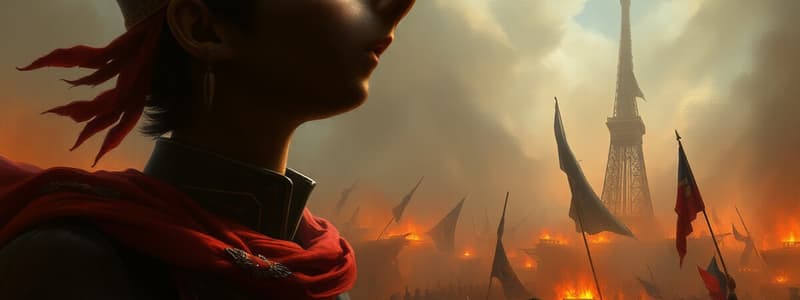Podcast
Questions and Answers
What primarily motivated the attack on the Bastille by the Parisians?
What primarily motivated the attack on the Bastille by the Parisians?
- Quest for new trade routes
- Desire for constitutional monarchy
- Revenge against foreign soldiers
- Fear of government troops and famine (correct)
What was significantly impacting the lives of peasants leading up to the revolts in 1789?
What was significantly impacting the lives of peasants leading up to the revolts in 1789?
- Political stability and prosperity
- Soaring grain prices and widespread famine (correct)
- A surplus of crops causing lower prices
- Increased wages in urban areas
Which faction did the Marquis de Lafayette lead during the revolutionary period?
Which faction did the Marquis de Lafayette lead during the revolutionary period?
- Royalist supporters
- Radical Paris Commune
- National Assembly
- Moderate National Guard (correct)
What response did the 'Great Fear' lead to among the peasants?
What response did the 'Great Fear' lead to among the peasants?
What was the role of the Paris Commune in the French Revolution?
What was the role of the Paris Commune in the French Revolution?
Flashcards are hidden until you start studying
Study Notes
Political Crisis of 1789
- The worst famine in memory occurred in 1789.
- Starving peasants wandered the countryside or traveled to cities, increasing unemployment.
- Grain prices went up drastically, with individuals spending up to 80% of their income on bread.
The "Great Fear"
- Fearful rumors spread, leading to the "Great Fear."
- Tales of attacks on villages and towns fueled panic.
- Fearful peasants, fueled by hunger and anxiety, unleashed their rage on nobles seeking to reinstate medieval dues.
- Defiant peasants set fire to manor records and stole grain from storerooms.
- The attacks eventually subsided, but they reflected peasant dissatisfaction with the old regime.
Paris in Arms
- Paris, the capital and foremost city of France, served as the revolutionary hub.
- Several factions competed for power.
Moderate Faction
- The Marquis de Lafayette, known as the "hero of two worlds," having served alongside George Washington in the American Revolution, led this faction.
- Lafayette commanded the National Guard, a primarily middle-class militia formed as a response to the arrival of royal troops in Paris.
- The Guard was the first group to embrace the tricolor—red, white, and blue—which later became the flag of France.
Radical Group
- The Paris Commune replaced the city's royalist government.
- It could mobilize entire neighborhoods for demonstrations or violent actions to advance the revolution.
- Newspapers and political clubs, holding views even more radical than the Commune's, thrived throughout the country.
Studying That Suits You
Use AI to generate personalized quizzes and flashcards to suit your learning preferences.




